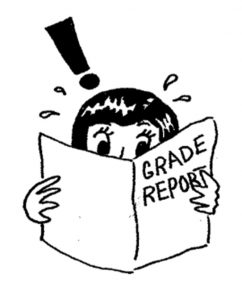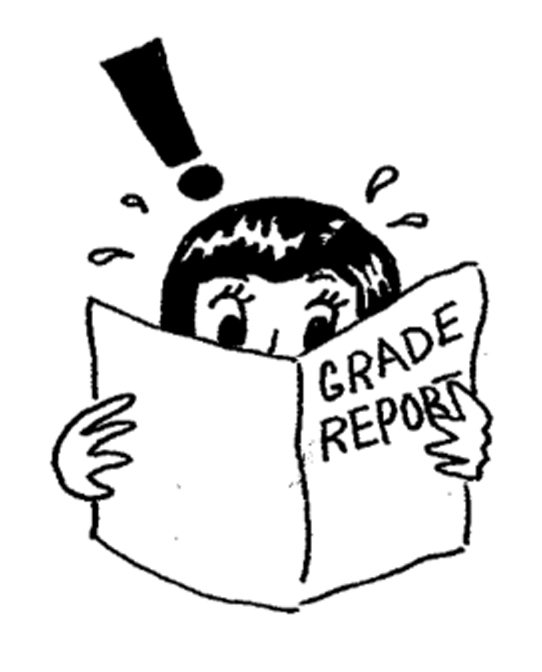 To an ever-growing extent, the very concept of grades, or the attempt to accurately quantify learning, is a lingering artifact from an increasingly extinct approach to teaching and learning.
To an ever-growing extent, the very concept of grades, or the attempt to accurately quantify learning, is a lingering artifact from an increasingly extinct approach to teaching and learning.
If grades are a necessary component of the larger institution of learning, then I believe it is the responsibility of the 21st Century Educator to re-imagine exactly why a grade is important, what it represents and how it is arrived at and “awarded”
What are the implications of removing numeric values from all forms of formative and summative assessments?
I know a lot of teachers have this in common: My experience as a High School student was disastrous. Truly! I have no idea how my parents survived it. And now, as a Dad to two young children, the mere thought of it strikes fear from within (my hands are shaking as I write this). Partly because of my lasting memories (nightmares), I believe my best moments as a teacher have been extreme detractions from my memories. It’s a pretty simple approach isn’t it? Just do what my teacher’s didn’t do (this is probably harsh. I did love some of them… liked some of them… liked at least one of them). I mean, over the years, I think I’ve substantiated relatively effectively this approach with actual pedagogy, but still, my own high school experiences remain perched above my “day-to-day” as a haunting reminder. The correlation between me in high school and the students in my class is very direct, if not inverted: the less their experience resembles mine, the more exhilarating and lasting it is. I really do believe this. However, no matter the level of student engagement or the extent to which students “achieve” beyond their perceived limitations – overcoming insecurities, discomfort or obstacles in reaching solutions, breakthroughs or epiphanies – the entire process of learning is continuously and inevitably undermined by the powerful force of GRADES. This is a battle I’m tired of losing!! Ahhh! To great frustration, I have watched it again and again and again: a student receives a grade – usually a number – on a particular assessment or at the end of a grading period in the form of a “Report Card”, and the student immediately becomes lost in its power. Suddenly, this number is all that the student cares about, and all of that wonderful learning s eems forgotten. It is too often an immovable obstacle in the way of authentic feedback. The number is an obsession.
eems forgotten. It is too often an immovable obstacle in the way of authentic feedback. The number is an obsession.
To an ever-growing extent, the very concept of grades, or the attempt to accurately quantify learning, is a lingering artifact from an increasingly extinct approach to teaching and learning. My teachers assigned grades! Doesn’t that mean I shouldn’t? A grade, in a traditional sense, paints a narrow picture of a student. And this may be appropriate if the approach itself is narrow (yikes!). However, in a 21st Century context, this picture is damaging to the extent that it blocks from the teacher’s view the much larger and telling picture of a particular student. This can effectively reduce and even undermine a much broader scope of learning. Most damaging is the extent to which grades adversely affect a student’s sense of self. A learner’s identity is too largely formed by the implications and stigmas of a grade, as opposed to the meaningful, unique and personal interactions with learning and a given culture of learning.
If grades are a necessary component of the larger institution of learning, then I believe it is the responsibility of the 21st Century Educator to re-imagine exactly why a grade is important, what it represents and how it is arrived at and “awarded”. It is also my belief that this process begins with an imagining and discussion of a culture absent of grades. As educators, let’s remove ourselves entirely from a tradition of grades that, no matter how passively, is inevitably present in our own routines, maybe even to the extent of unrecognized biases. I mean maybe we’re not quite there yet in practice, but let’s at least have some fun in discussion. Let’s forget the larger picture and consider this purely through a lens of actual learning: What are the implications of removing numeric values from all forms of formative and summative assessments? Seriously, at least for the purpose of conversation, let’s free ourselves.
What do YOU think?



Love this post Graham – this is also what @nbendle is contemplating as well. I would recommend that you check out The Mastery Transcript movement.
Check out: http://www.mastery.org/
This is a movement that is actually pushing the other way against grades. They are saying (loosely) that IF grades are an imperfect, even problematic, measurement of student learning THEN we can rethink how we communicate their learning to, and to get into, post-secondary institutions.
They have great resources (http://www.mastery.org/resources/), one of which is this article from the Atlantic Monthly: https://www.theatlantic.com/education/archive/2016/02/whats-wrong-with-college-admissions/462063/ which, if you haven’t read, is totally worth it.
It’s been echoed by great thinkers on education like Sir Ken Robinson (https://medium.com/@worldleadershipschool/mastery-transcript-consortium-big-idea-at-naisac-8989eb3594a4) and Tony Wagner.
I’d love to know your thoughts, and whether or not this is something that Cohort 21 can get behind.
Thanks,
garth.
Amazing Resources Garth and Thank you! Yes, I am aware of the unbelievably ambitious Mastery Transcript Movement. Truthfully, I’m scrambling to understand its extent. In general, I’m all in! I mean of course I am. But I also want to be careful to fully engage in the conversations along the way. Because of my own experiences as a student, I have a strong sense of everything problematic with assigning numeric value to learning. I also want to make sure I fully understand it and can properly explain it. For instance, in reading about Finish Schools (yes, Finland again!), I’ve begun to think about grades a normative system of ranking. It’s an inevitability: if you assign grades to learning you are also ranking students. I’ve never thought of it quite like this before. With ranking you inevitably have winners and motivation and determination and growth. You also have losers and demoralization. How many of us set out to demoralize our students?
Still thinking of how this might warm to an Action Plan. Very excited to continue talking about it.